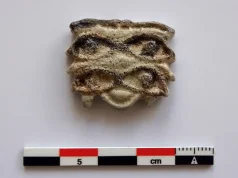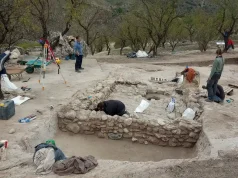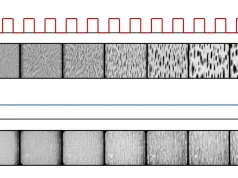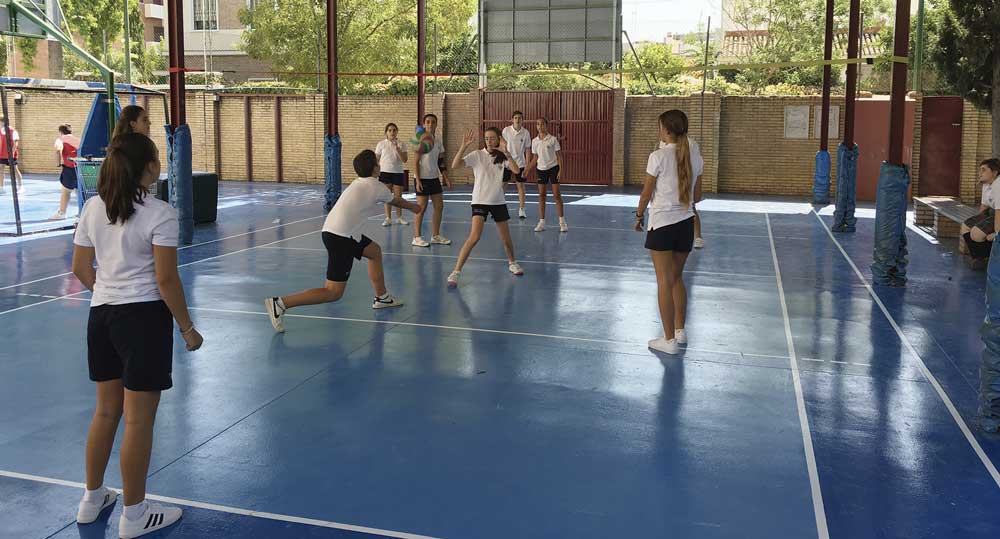José Ruiz Mas
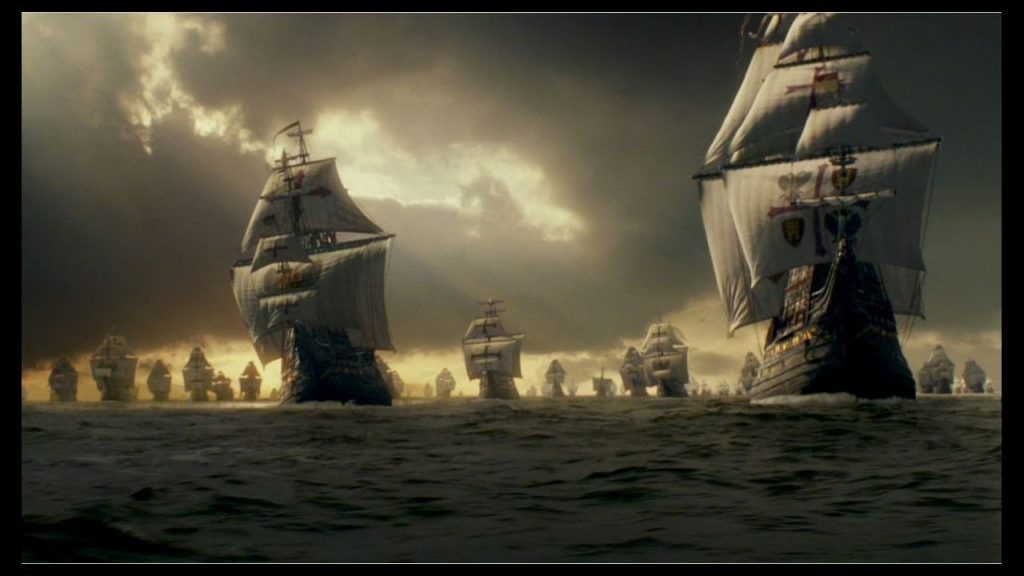
The main mission of the so called “Spanish Armada” (led by the Duke of Medina Sidonia), was to transport the Spanish Flanders’ armies in the Netherlands (led by Alejandro Farnesio, Duke of Parma) to England by crossing them through the narrowest part of the English Channel and proceed to the English invasion. However, when the linking operation failed (Parma had not done his homework and had not prepared his troops for the journey), the Spanish Armada left the English Channel and headed northwards, favoured by the winds, with the intention of sailing back to Spain by going southwards through the Atlantic. Alas, the Armada’s mission had not been fulfilled.
However, on route home through the temperamental Atlantic Ocean, many Spanish vessels needed to replace provisions, fix repairs and obtain drinking water and were forced to attempt emergency stops in Ireland. The Armada was unlucky enough to suffer the giant Atlantic gales and storms and many of its ships also felt the wrath of the treacherous cliffs off the west Irish shores.
An approximate number of 24 to26 Spanish vessels (probably more) are thought to have shipwrecked on the Scottish and Irish coasts and many of their crews massacred, especially in the north and west of Ireland. English historiography, when providing the English nation’s version of the story of the Spanish Armada, has constantly insisted on telling the world about their resounding naval victory. According to them, theirs was the greatest victory in the history of humankind.
Furthermore, the Spanish defeat was perceived by the English as the beginning of the end of Spain’s supremacy in the world. But Ireland’s role in the Spanish disaster was kept silent. The negation of Ireland in the English “victory” was disguised in the English narration of the Spanish Armada’s venture, so as not to make the English war merits less “English”.
The Anglo-Irish poets, nationalists at heart and in deeds, enthusiastically used their pens and “gifts of the gab”, especially from the 20th century onwards, to narrate the Irish episode of the Armada in their own version and from their own stand. The merit of the “victory” was not British.
In fact, Ireland played a large part in it. And not only that: their poetic narrations insisted on depicting their feelings of sympathy and solidarity with the many Spanish shipwrecked outcasts that were massacred by the English and never came to see Spain again. Poetry and folk music have been Ireland’s weapons to provide Ireland with the leading role that she deserves in the narration of the Spanish Armada story.
Irish writers have on the whole retroactively sympathized and recreated with a strong spirit of solidarity the ordeal that many of the Armada refuges went through on their rocky coasts and on their unwelcoming lands of inhospitable climate back in the 16th century. However, some Irish poets nowadays do have to also lament that the Spaniards had not always been received amiably by their 16th-century compatriots and ancestors, either due to fear of the powerful and merciless English claws of the Irish population at the time (under the constant threat of the Spanish invasion), or simply for poverty, as they were also in desperate need for survival themselves and the Spanish vessels were popularly believed to be full of riches and bounty. In fact, sad as it may be to admit it, in 1588 many local hunger-stricken Irishmen and women killed or beat Spaniards to deprive them of their possessions or because they were Protestant allies to the English occupation army in Elizabethan times.
Despite the reality of this historical fact, Anglo-Irish poets have traditionally avoided including many (if any) mentions of the harsh treatment given by the Irish folk to the Spanish outcasts that were unfortunate enough to arrive on its ragged shores. Indeed, the constant mood perceivable in Anglo-Irish poetry on the Armada ordeal in Ireland is that of sympathy, understanding and charity for the downtrodden refugees in desperate need.
Some of these poems also mentioned examples of English cruel punishment (martyrdom, beheadings and imprisonment) applied on the Spanish outcasts, to the Gaelic chieftains or to the Catholic Irish priests and bishops who aided the Spaniards. The local Irish population often paid with their lives for their humanity and gallantry and for their open demonstration of Catholic comradeship or for their anti-English political stand shown when helping Spaniards out.
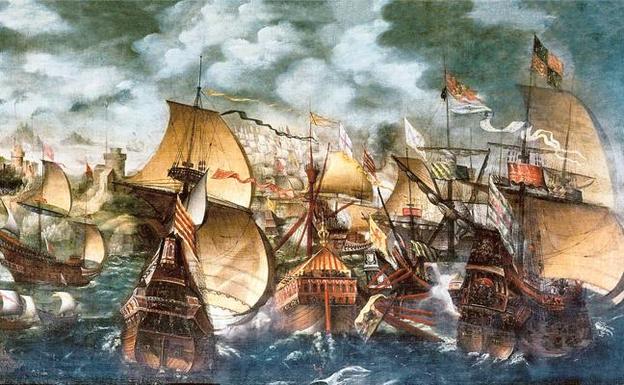
The deaths of these virtuous and empathetic Irishmen as a consequence of having provided generous shelter to the Spaniards were often seen, described and praised by the Irish poets of the 19th century onwards as symbolic episodes of rebellion or resistance on political or religious grounds against the English/Protestant occupiers of the island.
In the Anglo-Irish poetry of the late 19th century and the early 20th century, when the Irish nationalist spirit allows the ideological break-away from the official British perception of history, shipwrecked Spaniards begin to be treated sympathetically. The tone of the Anglo-Irish poems dealing with the tragedy of the Spaniards is now usually of nostalgia and of some embarrassment.
The Spanish are often portrayed as fragile (both physically and spiritually) and eager to please, sometimes even lovable and therefore prone to forming a romantic attachment with the local girls resulting from the humane and charitable asylum that these lonely dwellers in remote corners of the Irish Atlantic coasts gave the exotic and cosmopolitan newcomers. This generally positive depiction of Spaniards contrasts with the negative image too often depicted in British anti-Spanish propaganda at the time, where the Armada soldiers (any Spanish soldiers in fact) were invariably described as treacherous, cold and cruel, deadly warlike machines or effective Inquisition-agents armed with bibles, pikes, cannons and metal armour, or as ridiculously pathetic and laughable braggarts.
In a more overtly and consciously political leaning, from the late 19th century onwards Irish poets started to portray the Spaniards as defenders of Catholicism against Protestantism and against the English rule in Ireland.
They wrote nostalgically and regretfully that the opportunity to throw out the English enemy in the 16th century with the Spanish help was lost. The Irish priests, bishops, noblemen and peasants in 1588 who did aid the helpless Spaniards were often converted into the protagonists of numerous Irish ballads and poems chanting the kindness of their humane Catholic natures, their sense of honour, their manliness and their bravery against the pawns of Queen Elizabeth in Ireland, very often with tragic consequences for themselves. A number of poems in the form of elegies were made in Ireland to lament the fate of the main two victims of the English, the Spanish Armada refugees and the local brave Irishmen who helped the Spanish newcomers and paid dearly for their good deeds.
The best known example of the Spanish Armada used by an Irish poet as an excuse to praise his land’s patriotic feeling and to praise episodes of anti-English struggle in Irish history is the poem “O’Rourke’s Request”, by the nationalist politician and writer Timothy Daniel Sullivan, ex-mayor of Dublin, MP in Britain’s Parliament and author of the lyrics of Ireland’s unofficial national anthem “God Save Ireland”. “O’Rourke’s Request” is a ballad-like poem in nineteen quatrains where its speaker, O’Rourke, that is, the historical Brian O’Ruairc (Prince of Breffni, c.1540-1591), recites his last words before his execution in London in 1591 after having been sentenced to death for having aided Spaniards of the likes of the famous Captain Francisco de Cuéllar, all of them considered enemies of the English queen and of England.
O’Rourke was accused of sheltering Spanish sailors and soldiers shipwrecked from the Armada in Connaught. He did indeed give sanctuary to Captain Cuéllar and other Spaniards and indeed he paid for this. However, the Irish nobleman insists in his defence in front of the English judges that helping them was no crime; in any case, the opposite, for he helped Christians in need, as much as he would have helped an enemy
Englishman had he been in the same position of mortal peril. He is proud of what he did and of being Irish and he is not going to ask for mercy from the cold English queen. The only favour he asks from his executors is to be allowed to look in the direction of his beloved Ireland as we waits for the axe to strike.
Anglo-Irish poetry on the Spanish Armada in the 20th and 21st centuries is characterized by three recurrent themes:
- a) the marriage of poems, folk music, Gaelic folklore, legends and mythology;
- b) the depiction of a strong Irish-Spanish communion through the poets’ assumed Black Irish identity;
- c) the description of the destructive power of nature, so much so that with all the legendary naval strength the Spanish vessels can do nothing to stop it and feel at the mercy of gales, storms and cliffs.
Indeed, the tragedy of around two dozen shipwrecked Armada vessels on the Atlantic Irish coast has given rise to a poetic corpus whose main visible feature is its comfortable and fruitful combination with other poetic depictions of narratives taken from Ireland’s national folklore and from Celtic mythology as well as from anti-English/nationalistic literature. The ordeal of the Spanish outcasts and of the Gaelic chieftains and men of the cloth who gallantly supplied the newcomers with humanitarian refuge combined well with Irish/Gaelic folklore and with other relevant artistic manifestations. One of these was music, which was usually of a nostalgic and elegiac nature and gave rise to a new literary subgenre: Armada elegiac folkloric narratives accompanied by folk music.
In 1985 the Northern Irish musician Shaun Davey composed a 35-piece orchestral recreation (accompanied also by Irish instruments such as the harp and the pipe) of the life of the 16th-century Irish pirate queen Gráinne O’Mally/Granuaile (1530-1603) specifically for the Dublin singer Rita Connolly (whom afterwards Davey ended up marrying). The long-play record, Granuaile, released in 1986, included a musical lament in the form of a poem in unrhymed tercets on the ordeal of the Spaniards in 1588. Its title is “The Spanish Armada” (with lyrics and music by Shaun Davey himself). There is a clear feeling of shame and embarrassment on the poet’s part and on the poem’s narrative voice as to the behaviour of the English repressors and of the savage local folk. He wishes he had not been a witness of so much death and destruction. So many lives were lost that could have been used to provide new blood for the Irish population.
The Dublin poet Paul Durcan, Professor of Poetry, published Daddy, Daddy in 1990, which consisted of a collection of thirty-eight elegiac and counter-elegiac poems addressed to his deceased father, a barrister and judge with whom he had not had a fluent relationship. In Daddy, Daddy Durcan included his celebrated poem “Nights in the Gardens of Clare”. “Nights in the Gardens of Clare” is a fantasy poem in the form of a dialogue between two lovers, Soledad, the Spanish daughter of a ship’s captain who has survived the shipwreck of the Armada ship “San Marcos”, and Donal Thornton, a local Irish silversmith from Co. Clare. The fantastical aspect of the poem is attributable to the fact that no Spanish woman seems to have arrived at the Irish coasts in 1588 in an Armada vessel, therefore the romantic alliance between Soledad and Donal is most unlikely to have happened from a historical point of view, to say the least, except in the imagination of the poet. This poem belongs to the literary and folkloric tradition of love relationships that developed between Spanish sailors and soldiers and local Irish cailíns in the 16th century; but this time with a variation: it is the love story of a shipwrecked Spanish lady and a local Irish boy. Following the musical tradition of the Irish people, only two years before the inclusion of “Nights in the Gardens of Clare” in Daddy, Daddy (1990), the musician and composer Mícheál Súilleabháin (Clonmel, Co. Tipperary; 1950-2018), professor of music at Limerick University, had put music to the poem, thus turning it into an oratorio. It was first broadcast in RTÉ Radio 1 in 1988.
Some of the Anglo-Irish poets of the 20th and 21st centuries insisted in depicting themselves as Black Irish or descendants of the Spanish outcasts who formed romantic attachments with local cailíns. One of them is Kelly Cavanagh, a Canadian poet, song-writer and folk musician with a classical training. Cavanagh has been a prolific poet of narrative poems based on personal and free recreations of episodes of Irish history which he has often turned into folk songs. Cavanagh, of Irish parents, considers himself a “Black Irish” (that is, a descendant of the marriages between Spanish Armada refugees and local Irish girls) and fancies the idea that he has a Basque forefather who participated in the Spanish expedition in 1588 and was shipwrecked in Ireland.
In his long-play record Long & Tall Tales (released in 2011) Kelly Cavanagh includes a song of his own creation based on a poem of his own pen of the same title called “Black Irish (Wreck of the Spanish Armada)”. “Black Irish (Wreck of the Spanish Armada)” is a narrative description made by one of the Spanish participants of the Armada where he inserts his own critical perception of the military venture with a clear pacifist message against wars. An Irish chieftain, MacClancy, had the wretched soldier looked after by his own daughter, who treated the refugee with “such loving and care” (l. 62) that he decided to stay in Ireland with her for good. After being “brought to the arms of Colleen [a young Irish girl]”, i.e., MacClancy’s daughter, the Spanish soldier would never participate in any other war (l. 66-67). After “running” from the English towards the north, the Spanish fleet comes “on Donegal’s murderous shore” (l. 46).
Another example of a Black Irish poet is that of the psychoanalyst, radio broadcaster and poet Michael Murphy, author of the poetry collection The Republic of Love (2013). Murphy is another self-proclaimed and proud descendant of Spanish “Black Irish” through his great-grandmother’s line, of the surname of Guidera. Murphy’s ancestor had set sail aboard an Armada galleon in Galicia as a Spanish soldier and remained in Ireland for good after shipwrecking there. “The Pilgrim” (2013: 38-40) is the title of the poem in The Republic of Love dedicated to the Spanish Armada. In “The Pilgrim” Murphy does not only declare his spiritual connection with Spain (a country where he spends many leisure periods of time every year) but also the firm belief in his genealogical relationship with a Spanish Armada forebear, a genealogical line which he is deeply proud of. The use of some Spanish words in the poem is meant to give it a Spanish flavour or a Spanish authenticity that goes hand in hand with his insistence on the Spanishness of his ancestry. Of his own grandfather also named Guidera, whom he personally knew, Murphy writes in “The Pilgrim” that he, “Had a sallow complexion like a Spaniard / We have the photograph to prove it / A Laois campesino / Rich with Guidera blood (l. 10-13). Indeed, Murphy’s Spanish-Galician ancestor must have been a survivor of some undetermined shipwreck whose bones ended up (God knows how) in Borris-in-Ossory, a village in Co. Laois, far away from any coast. Even the poet himself cannot understand how his forefather Guidera could have ended up settling in the centre of Ireland after being shipwrecked on some unnamed Irish beach. Guidera, the poet’s forefather, must have been an exotic, attractive and seductive Spaniard, lucky enough to be able to experience Irish hospitality, especially that provided by the tenderness of a young Irish girl from a remote village in the middle of nowhere. The last theme of contemporary Anglo-Irish poetry is the depiction of nature’s strength. Spanish vessels are broken to pieces, led to unavoidable wrecks and disaster and their proud crews put to the test of the power of the waves, gales, storms, cliffs and climate. Despite their legendary naval strength, the Spanish vessels feel helpless at the mercy of the Atlantic temper.
The Irish poet Matthew Sweeny (Lifford, Co. Donegal, 1952-2018) had his posthumous poem “Armada” published in The Poetry Ireland Review (2019). In “Armada”, consisting of four five-line stanzas in free verse, Sweeney begins with a recreation of the moment of amazement that must have been imprinted in the eyes of the Donegal shepherd boys on that fateful day of July 1588 when, while keeping their sheep herds, they had the experience of witnessing the violent wreck of the Spanish ships in a biblical storm: “A big wind; hulls broken. / Men blown ashore” (l. 6-7). The young Irish shepherds know nothing about the victims of the storm apart from what they now see. Sweeney also equals the gaze of surprise of the local Donegal boys to the feeling of passive amazement experienced by the “darker / boys [who] saw three caravels” (l. 4-5), that is, the native Americans who saw the historic arrival of Columbus’s expedition in 1492, with the difference that now Ireland is “no Cortez rode island” (l. 10) to the Spaniards. The newly-arrived men do not come to Ireland to conquer, like Cortés did in Mexico. Now the Spaniards are on the losing side of history. But the Spanish newcomers are in fact well treated despite being refugees. The poet goes on with the description of the hospitality provided to a thousand men (from Spain, though there is still no explicit indication of their nationality) by the local (unnamed) Gaelic chief (presumably a Sweeney, an ancestor of the poet). The generous Gaelic chief fed them all in his fort and allowed them to stay until they could recuperate their lost health. The Spaniards “wintered / Among redhaired curious women”, and had their ruined ships picked (l. 11-15). The last stanza relates the departure of the “jigsaw ship” (presumably the “Girona”) towards Scotland and later to Spain. The gulls of the Antrim area were, as put by the poet, the only successful travellers to reach Spain, for the “Girona”, sunk in the area, never left Ireland and never reached Spain.
Daniel Wade is a young Dublin poet and playwright who graduated in English and Journalism at Dún Laoghaire Institute of Art, Design and Technology. He contributes with a monthly poetry column entitled “Poems from the Coast” to Coast Monkey’s website. “Jetsam at Lacada Point” is one of Wade’s poems from a Maritime Poetry Series, posted on the web in October 2017. It describes the sinking of the galleass “La Girona” off the Antrim coast on October 26th 1588 with more than a thousand men. As soon as “La Girona” set sail from Killybegs, a giant gale broke its rudder and the vessel sank off Lacada Point (Co. Antrim). There were only nine survivors.
“Finding a Voice” (2019), by the Sligo journalist and poet Eugene McGloin, is a poem of eight unrhymed tercets made up of twenty-four short lines published in Poetry Ireland Review (2019). It describes the moment (the “genesis” as McGloin calls it) when the Spanish Armada foundered at Streedagh beach among the stormy waves. The ships were suffering the mad anger of the sea, which is duly personified so as to look as if its state of mind had been provoked by a love deception. The tempestuous situation in which the three wretched ships see themselves in is described by the poet in the following terms: “The flowing tide bludgeons / A borderline on the seashore / Scorned by a lover / Wearing seaweed pearls, the ebb tide moves / Between rocks to form / Rivulets and sculpture-streams / With the scalpel incision of / Retreating love (l. 8-15).
After this brief review of the Irish participation in the construction of the narrative of the Spanish Armada’s venture in 1588, I cannot but conclude that Ireland’s poetic production has always been of a completely different nature to the English poetic production on the same subject. The Irish output is neither so triumphant nor as grandiloquent as its English counterpart. English poets have in most cases presented the Spanish Armada venture in 1588 as the greatest naval Spanish fiasco and as England’s own greatest victory in the history of mankind. However, unlike their epic English counterparts, the Irish poets, most of them Catholics, have traditionally sided psychologically with three main protagonists of the Irish chapter of the Armada’s disaster: a) with the losing shipwrecked Catholic soldiers and sailors from Spain; b) with the local Irish Catholic chieftains and men of the cloth who provided the wretched outcasts with generous hospitality when they were washed ashore in search and need of desperate help; and c) with the warm and lonely rural Irish cailín who provided the exotic and forlorn Spaniards with shelter, love, a home, a family, a new identity, and a new future.
José Ruiz Mas, profesor titular del Departamento de Filologías Inglesa y Alemana de la Universidad de Granada.




